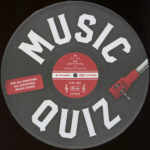Huffington Post this week <a href=”https://www.huffingtonpost.com/entry/jerry-garcia-earliest-known-recorded-performances_us_5adc84e3e4b009869bfa293a”>posted</a> two recordings from Jerry Garcia when he was 18 years old. The recordings of “All My Trials” and “Trouble in Mind”, the earliest known of Garcia, were made at a party in Menlo Park, CA on May 26, 1961. The host was an audiophile who had the foresight (or, more likely, the luck) to turn on his reel-to-reel tape recorder to get crystal clear recordings of a very folksy, very young Garcia. The guitar playing wasn’t intricate. Commentary in the piece said that it was the playing of a beginner. It was, however, the unmistakable voice. An added bonus is that Garcia is accompanied by none other than <a href=”https://dailymusicbreak.com/rock/the-great-robert-hunter/”>Robert Hunter</a>.
<img class=”wp-image-33711″ src=”https://dailymusicbreak.com/wp-content/uploads/2018/04/The_cuckoo-205×300.png” alt=”The_cuckoo” width=”461″ height=”675″ /> <em>A broadside of a version of The Cuckoo published between 1780 and 1812.</em>
This blog is not about those recordings. It’s about how songs persist through time. Perhaps the clarity and immediacy of the recording had something to do with the thought. It’s Garcia and Hunter when they were literally months into their musical careers. I emailed with my brother about the performance and the conversation touched on old English songs that have survived until today.
The Cuckoo was one such song. The Daily Music Break has previously posted a version of the song by Clarence Ashley. It’s a great clip. Ashley, who started performing in 1911, is being interviewed by a young man in what seems to be an old time town square. The setting doesn’t seem too far off from Mayberry (or Mount Pilot, for that matter). Ashley is entertaining and enlightening. He says great things, such as “I always was crazy about the show business” and “I was born in 18 and 95.” It’s amazing how sticking in an extra article or conjunction in a sentence can place a person in a time and a place.
Ashley plays “The Cuckoo” toward the end of the clip. Wikipedia does a great job — it always does — of tracing the lineage of the song. It goes way back. The article is accompanied by a page of lyrics published in 1811. It brings to mind a song that no doubt is more familiar to folks who read this blog: “John Barleycorn Must Die.” (Here is a stunning relatively recent <a href=”https://dailymusicbreak.com/slider/steve-winwood-john-barleycorn-must-die/”>version by Steve Winwood</a>.) The similarity is that both songs give human qualities to nonhuman objects: Barley is one and a bird in the other.
These songs, like paintings, are snapshots of a world that is long past. The interesting and great thing is that the songs continue to evoke something in artists that keep them from dying. The Cuckoo is an English folk song that is more than 200 years old. But it’s been performed by Bob Dylan, Taj Mahal, Rory Gallagher, Janis Joplin, Richard Thompson and many others.
The site Mainly Norfolk — which looks great — has a long feature that describes slight variations in lyrics of different versions. The article starts with an excerpt of liner notes by A.L. Lloyd from an album he released in 1956 called “The Foggy Dew and Other Traditional English Love Songs.” The passage is worth <a href=”https://mainlynorfolk.info/lloyd/songs/thecuckoo.html”>quoting at length</a>:
<blockquote>Spring cannot start till the cuckoo sings. Perhaps that is why the cuckoo is a magical a bird. Turn your money when you hear him first and you’ll have money in your pocket until he comes again. Whatever you’re doing when you hear him, you’ll do most often throughout the year. Especially if you’re in bed. No bird is more oracular. It can prophesy how long a man will live and a girl remain a maid. There is no better omen for love than the song of the cuckoo, the beloved bird of folklore. On the other hand, he is the sly creature who gave us the word ‘cuckold’. The flattering invocation to the cuckoo in this widespread song is perhaps in the nature of a magical safeguard for the worried lover.</blockquote>
One funny note about the song is that the English versions say that the cuckoo doesn’t sing until springtime is near. Many American versions, however, say that the bird not sing until the fourth of July.
<script type=”text/javascript”>
amzn_assoc_placement = “adunit0”;
amzn_assoc_search_bar = “true”;
amzn_assoc_tracking_id = “tdmb3-20”;
amzn_assoc_ad_mode = “manual”;
amzn_assoc_ad_type = “smart”;
amzn_assoc_marketplace = “amazon”;
amzn_assoc_region = “US”;
amzn_assoc_title = “More Folk and Americana”;
amzn_assoc_linkid = “c96d4959781e4740948acc4b95362cad”;
amzn_assoc_asins = “B00N21EPG4,B005DUJHZQ,B000S9CAY2,B0057TU856″;
</script>
<script src=”//z-na.amazon-adsystem.com/widgets/onejs?MarketPlace=US”></script>
The version of the song above was done by none other than Big Brother and the Holding Company which, of course, featured Janis Joplin. It has the band’s usual intensity. Other versions are more logical: Richard Thompson and Rory Gallagher were born in Europe (England and Ireland, respectively) and the song was probably part of their musical upbringing. Its performance by Big Brother and, for that matter, Taj Mahal show how a great song finds a way to live on.
Another interesting version of The Cuckoo was done <a href=”https://en.wikipedia.org/wiki/Jean_Ritchie”>by Jean Ritchie</a>. Ritchie lived between 1922 and 2015 and lived in the Appalachian Mountains. Wikipedia says that she was a folk music singer, songwriter and Appalachian dulcimer player. She learned folk songs orally from family members and her community as a child and spent the rest of her life circulating them in concerts and on records. Her nickname, according to the profile, was “Mother of Folk.”
Ritchie was born and died in the Cumberland Mountains of southeastern Kentucky. The Ritchies and the Combs family were the two ballad-singing families of the region. They lived in an adjacent county.
This post, like many at The Daily Music Break, is a bit disjointed. It jumps from Garcia to “The Cuckoo” to Clarence Ashley to Janis to Jean Ritchie. That’s okay. The point is that some songs find their way from country to country and from era to era. “The Cuckoo” was written centuries ago in England and found its way to the United States, Canada, Scotland and Ireland. It became so deeply embedded in American tradition that many people probably assume it was written here.










Recent Comments